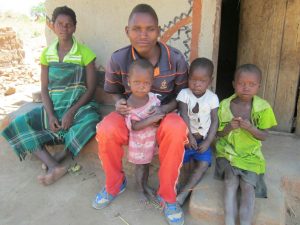Imagine if you had to grow your own food to survive. How would you do it? What if you had to do it all by hand with no fancy equipment? Would you be able to grow enough to feed your entire family for a year? Probably not.
For most Malawians, farming is essential for survival. If you don’t grow enough, you don’t eat. It’s that simple. Unfortunately, up to 40% of the families Pamoza serves only grow enough to last 6 months of the year. After that, they engage in ganyu, piece work they do for others, getting paid in food or income they use to buy food. However, ganyu takes time away from their own farm work, leading to a cyclical process where they don’t grow enough the following year. We call this the cycle of hunger.
In order to stop this cycle of hunger, Pamoza, with the support and initiative of some students from Eastern University, has began a food security initiative targeting persistently food insecure households. We gave these families temporary food relief combined with training, fertilizer, seed, and monitoring in an effort to help them grow enough food for their families and extra to give back to the program so that Pamoza can help additional families. All it takes is $200 to supply one family with the inputs and training required to break the cycle of hunger.
We have started with 50 families like the Botha family. They only grew 300 lbs of food last year and started running out of food only after a few months. Contrast that with the fact that the average American family of four throws away over 1,000 pounds of food per year (National Geographic, 2014). That’s a stark difference.

Our program is already changing lives. We started by providing food relief to food insecure households so they can focus on working on their own farms. Emma, one of our beneficiaries says, “For the first time since I married my husband, we are now able to have two meals per day.” For that, she is thankful but we know we can do better. So over the next few years, we will continue to monitor and support food insecure households so that they can permanently break the cycle of hunger and support their families with enough food.
You can help. A donation of $200 is enough to supply fertilizer, seed, training, and support to help food insecure families grow enough food. Support us today.